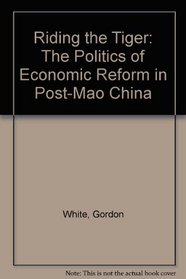Since the late 1970s China has been undergoing a profound economic transformation ushered in by the wide-ranging program of market-oriented economic reform introduced under the leadership of Deng Xiaoping. While most other studies of the reforms have dealt with their economic effects, Riding the Tiger is about the political dynamics of these reforms - their political origins and impact, and the nature of the political forces which have conditioned their character and effectiveness. It analyzes the politics of institutional reform in industry and agriculture, the impact of new market thinking and realities on China's traditional Marxist-Leninist ideology and its dominant political institution, the Chinese Communist Party. It also traces the impact of economic reform on Chinese social structure and institutions, showing how the spread of market relations has led to greater diversity in social attitudes, interests and institutions. These changes, Gordon White argues, are in turn giving rise to ineluctable pressures for reform in political institutions, thereby exploding the original assumption underlying the reforms that economic transformation could be achieved without fundamental political changes. The book concludes by assessing various options for China's political future, arguing that an abrupt transition to some form of multi-party democracy is less desirable than a more gradual, stable and managed "dual transition" - first from a "totalist" to an authoritarian political system, and then from an authoritarian to a democratic political system.
Search -
Riding the Tiger: The Politics of Economic Reform in Post-Mao China
Riding the Tiger The Politics of Economic Reform in PostMao China
Author:
Author:
ISBN-13: 9780804721486
ISBN-10: 0804721483
Publication Date: 3/1/1993
Pages: 286
Rating: ?
ISBN-10: 0804721483
Publication Date: 3/1/1993
Pages: 286
Rating: ?
0 stars, based on 0 rating
Publisher: Stanford University Press
Book Type: Hardcover
Other Versions: Paperback
Members Wishing: 0
Reviews: Member | Amazon | Write a Review
Book Type: Hardcover
Other Versions: Paperback
Members Wishing: 0
Reviews: Member | Amazon | Write a Review
We're sorry, our database doesn't have book description information for this item. Check Amazon's database -- you can return to this page by closing the new browser tab/window if you want to obtain the book from PaperBackSwap.
Please Log in to Rate these Book Reviews
Genres:
- Business & Money >> Biography & History >> Policy & Current Events
- Business & Money >> Economics >> Development & Growth
- Business & Money >> Economics >> Economic Policy & Development




